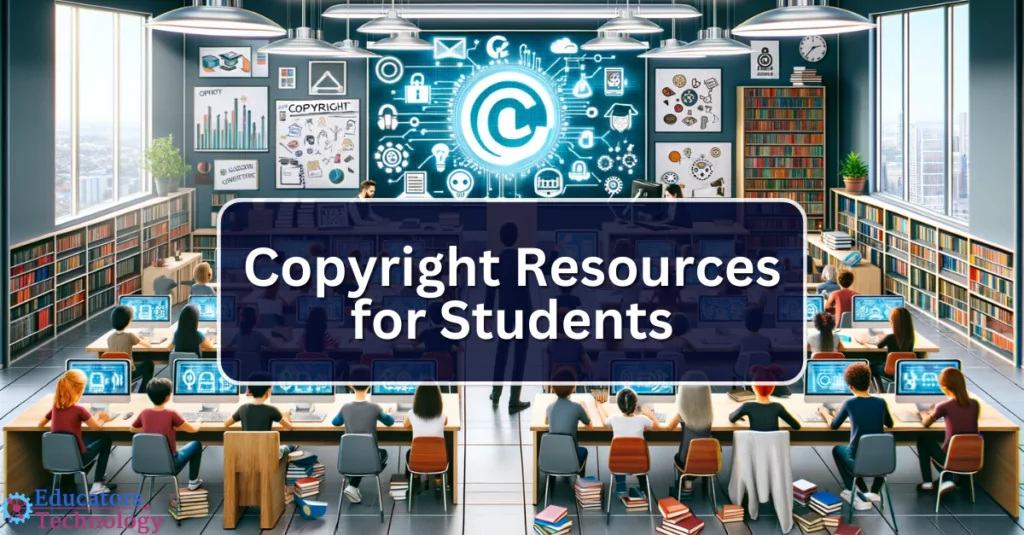In our increasingly digital world, where a vast ocean of information and creative content is just a click away, understanding the nuances of copyright has never been more important. For students and teachers navigating this digital landscape, a solid understanding of copyright laws is not just about legal compliance; it is about cultivating a culture of respect for intellectual property, encouraging ethical academic practices, and encouraging responsible digital citizenship.

As educators, we have a responsibility to guide our students in the ethical and legal use of digital resources, ensuring that they understand the implications of their actions in the digital space. Meanwhile, for students, learning about copyright is essential to developing critical thinking, honing their media literacy skills, and preparing for a future where digital fluency is imperative.
In today's post, I share with you this collection of useful resources that you can use with your students to teach them about copyright. But before we delve into the collection, let's first discuss why it's essential to learn about copyright.
Related: Which Creative Commons license should I use?
Why is it important to learn about copyright?
Learning about copyright is crucial for both students and teachers for several reasons:
- Promotion of the ethical use of information: Understanding copyright laws teaches students and teachers the importance of respecting the intellectual property of others. This awareness encourages ethical academic and professional practices, such as properly citing sources and avoiding plagiarism.
- Foster creativity and innovation: By understanding what is legally permitted, students and teachers can explore creative ways to use existing works without infringing on the rights of the original creators. This understanding can inspire innovation within the confines of the law.
- Legal awareness and compliance: In an era where digital resources are widely used in education, it is vital that both educators and students know what materials can be legally used or shared. This knowledge helps avoid legal repercussions that can arise from copyright infringement.
- Critical thinking and media literacy: In the process of learning about copyright, students develop critical thinking skills. They learn to differentiate between credible sources, understand the implications of sharing and using digital content, and become more demanding consumers of information.
- Preparation for future careers: In many professions, understanding copyright is essential. Students planning careers in areas such as writing, filmmaking, graphic design, and digital content creation should understand copyright laws to protect their work and respect the rights of others.
- Navigating the digital landscape: In today's digital world, content is easily accessible and shareable. Educating students and teachers about copyright helps them navigate this landscape responsibly, understanding what content can be legally downloaded, shared, or modified.
- Promote respect for intellectual property: Teaching about copyright instills respect for intellectual work and creativity. Emphasizes the value of original work and the effort that goes into creating educational materials, literature, art, and other intellectual properties.
- Adapt to technological advances: As technology evolves, so do the ways in which content is created, shared and consumed. Understanding copyright laws helps students and teachers adapt to these changes and use technology responsibly and effectively.
Web resources to learn about copyright
Learning about copyright is essential for both teachers and students, as it helps them understand the rights and limitations regarding the use of creative works. Below are some valuable resources that can be used to learn about copyright:
US Copyright Office: Its official website provides comprehensive information on copyright laws, including educational materials designed specifically for educators and students.
Creative commons: A nonprofit organization that offers a variety of public copyright licenses. Their website includes educational resources that explain how Creative Commons licenses work and how they can be used.
Copyright Clearance Center: Provides resources and services for educators and students to understand and manage copyright issues, especially in academic settings.
Stanford University Libraries: Copyright and Fair Use: Stanford Libraries offers extensive resources on copyright and fair use, including case studies, legal documents, and guides tailored to the academic community.
EDUCAUSE Copyright and Intellectual Property Resources: EDUCAUSE offers a variety of resources including articles, toolkits, and webinars focused on copyright in education.
YouTube Copyright School: YouTube has an interactive resource that teaches the basics of copyright through engaging videos and quizzes, making it suitable for younger students.
Copyright Teaching: This website, a project of the Electronic Frontier Foundation, provides a curriculum that teachers can use to introduce students to the basics of copyright law.
khan academy: Offers courses and materials that explain the basics of copyright, often as part of larger courses on digital citizenship or media studies.
Plagiarism.org: While focusing on plagiarism, this site also provides resources that help understand the limits of copyright, especially in academic research and writing.
Academy of the World Intellectual Property Organization (WIPO): Offers free online courses on intellectual property, including copyright, suitable for both teachers and students.
Final thoughts
For teachers, instilling an understanding of copyright in students is not just about avoiding legal pitfalls; it's about guiding them to become ethical and responsible content users and creators. For students, it's about building a foundation of respect for intellectual property and understanding the impact of their actions in the digital world.
In this era of information overload, where the lines between creator and consumer are increasingly blurred, empowering our students with this knowledge is crucial. It prepares them not only for academic success, but also for responsible participation in the digital community and future careers. As educators and students, embracing this aspect of education helps us navigate the digital landscape with confidence, creativity, and a strong ethical compass.






